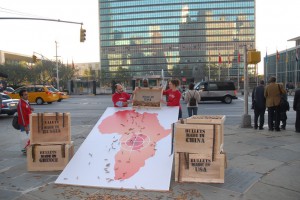Why is the Obama administration opposing global regulation of bullets in an ATT?
If the US already controls ammunition exports and believes that it is in their national interest to do so, why wouldn’t they want an ATT that requires other states to do the same?

The AK-47, probably the most ubiquitous weapon used today in conflict zones, was designed to have a life-span of 40 years. These and other weapons, distributed decades ago to fight the Cold War, are now being used to terrorize women, men, and children in conflict zones and areas of instability. Old weapons remain deadly because there are always a steady flow of bullets to load into them. A weapon only becomes lethal when it is supplied with ammunition. Controlling the flow of ammunition into zones of instability and conflict is just as important as controlling the actual weapons. An example from the Kenyan-Sudan border provides a window into why it’s so critical to control ammunition supplies. According to a Small Arms Survey investigation, “a dispute between Toposa and Turkana pastoralist warriors degenerated into a firefight that consumed all of their ammunition.” As a result of their rifles becoming useless, the rivals decided to resolve their differences peacefully.
So if controlling ammunition flows can help save lives and shorten the length of conflicts, why is it that I heard the Obama administration representative make an intervention at the United Nations yesterday saying that it opposes adding controls on international transfers of small arms ammunition into the proposed Arms Trade Treaty?
On February 28, governments at the United Nations discussed what types of weapons and which types of services will be included in an Arms Trade Treaty. Although the Obama administration has been pushing for a broad range of arms to be included in a potential Arms Trade Treaty, from small arms to aircraft carriers, US treaty negotiators are very clear that the US opposes the inclusion of small arms ammunition. This stance is somewhat surprising since US law already requires the export and import of bullets to be regulated. Before the US exports ammunition to any country it does a risk assessment, determining whether the bullets will be used for human rights abuse or diverted into the illegal market, and then makes a decision whether or not to export.
If the US already controls ammunition exports and believes that it is in their national interest to do so, why wouldn’t they want an ATT that requires other states to do the same?
Obama administration officials have often stated the reason they oppose such inclusion is because it is technically too difficult to trace how an individual bullet has been used after it has been exported. While concerns about tracing the origin of such ammunition after it has been found is certainly challenging, this is not a solid argument against requiring states in the ATT to control ammunition at the point of export, as the US already does and the ATT aims to do.
It seems like the real reason why the Obama administration is opposing any mention of small ammunition in an ATT is either they are using it as a negotiating chip or they fear the National Rifle Association (NRA), which has stopped Senate ratification of other agreements due to the issue of ammunition controls. I hope the US opposition is a tactic, and they are using it to trade the inclusion of bullets in the treaty for something else they want at some point in future negotiations. However, I fear that the opposition to including ammunition is fear of the US pro-gun lobby.
Without ammunition, an ATT will be like a gun without a bullet – interesting to look at but not able to do what it is designed to do. Other governments must step up the pressure and ensure the Obama administration changes course on this issue. UN member states who support including ammunition in the ATT might want to consider supporting a flexible approach to controls that address the technical limitations of ammunition regulation.
However, any approach must ensure that at a minimum the import and export of small arms ammunition is subject to risk assessments and authorizations before transfer across national borders. Such a provision, for example, would still seek to prevent private entities from exporting thousands of tons of ammunition to ruthless fighting forces abroad. It would also aid law enforcement authorities in tracing the origin of bullets found in transit because critical information on the ammunition can still be found as part of its packaging. While tracing used bullets will still not be as easy as tracking firearms, with such controls states can at least obtain key information on trafficking patterns.